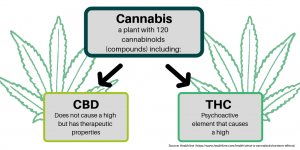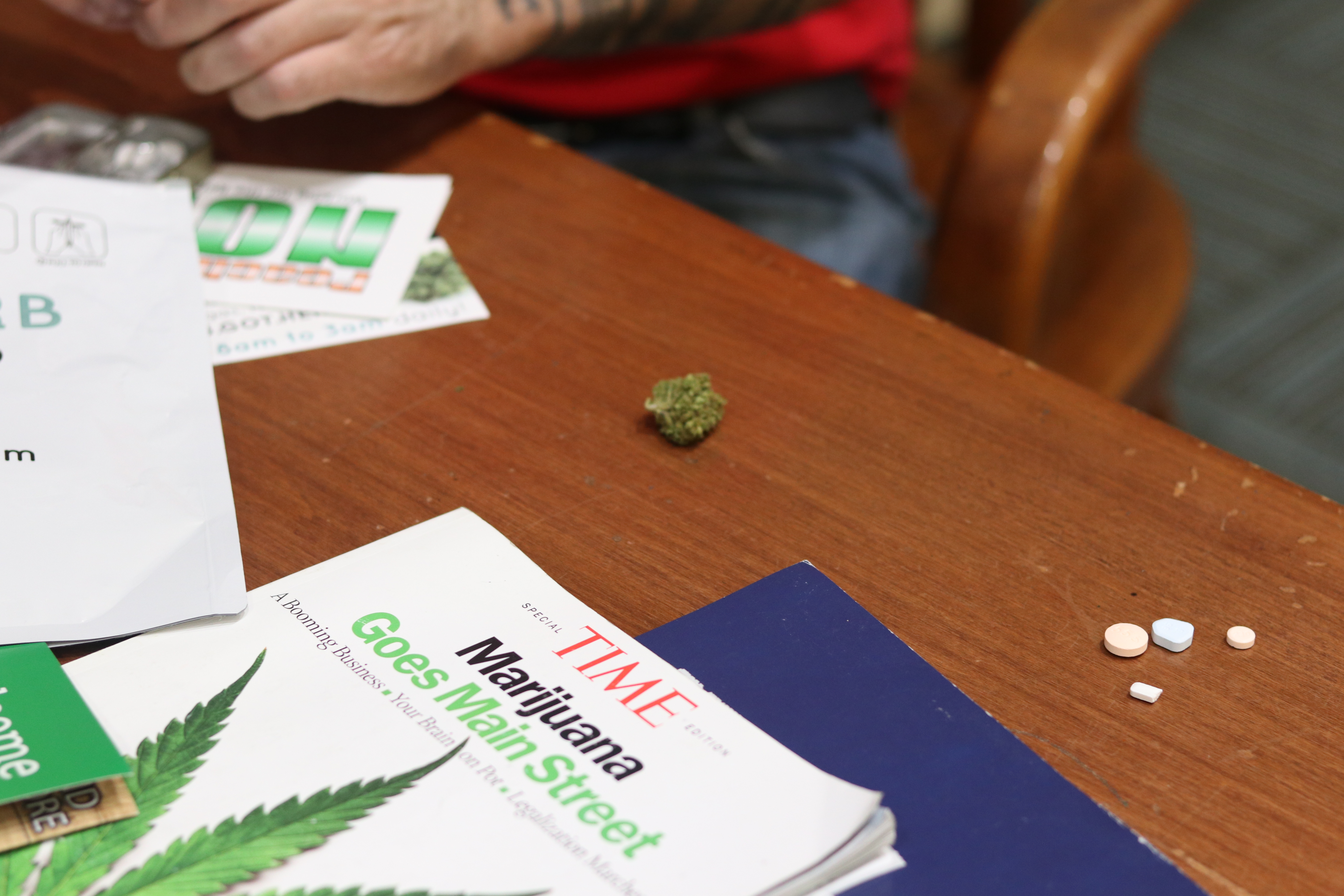When Nora Bushfield’s daughter was born, she gave her the name Jolie. Jolie means pretty in French, and her mother said she is. She’s beautiful.
When Jolie was nine months old, she started having uncontrollable seizures. Intractable, they’re called, because they can’t be stopped by typical treatment methods.
Jolie could have up to one hundred of these seizures a day. The seizures often led to injuries where she would fall and sometimes have to get stitches. Her mother said Jolie has been on anywhere from 30 to 40 different types of anticonvulsants and undergone a corpus callosotomy, an operation that split the matter between the two hemispheres of her brain, to try to put an end to the seizures.
“We were pretty desperate and ready to try just about anything,” Bushfield said.
None of it worked. But one day, Bushfield gave her daughter a lollipop.
The first time we gave her these lollipops, she went 10 weeks without a seizure,” Bushfield said.
These aren’t ordinary lollipops, of course. The lollipops are infused with cannabis. Bushfield received them from someone who was making them to help cancer patients with nausea.
Medical cannabis has come into the spotlight as a treatment option for patients suffering not only seizures, but a host of debilitating conditions, from cancer to Parkinson’s disease, multiple sclerosis, post-traumatic stress disorder, and more. Medical cannabis was legalized in Georgia with the passage of Haleigh’s Hope Act in 2015, but that legislation left a legal gray area for patients. Haleigh’s Hope Act allowed patients to have medical marijuana but did not legalize the cultivation or distribution of medical cannabis in the state.
https://twitter.com/jordanmeaker/status/1113934496875851777
This left patients in a conundrum. Thousands registered for medical cannabis permits but had few options for obtaining the drug. They couldn’t grow their own cannabis, as that would violate state law. There is no law that legalizes medical marijuana at the federal level, and marijuana is classified as a Schedule I drug, so it can’t be transported across state lines.
Haleigh’s Hope Act was essentially ineffective for a few years. Many people actually still believed medical cannabis was illegal in Georgia because, for all intents and purposes, it was.
“We never registered, because, why? It didn’t do anything for us,” Bushfield said.
House Bill 65, signed in May 2018, added a few more conditions to the list of conditions that can be treated with cannabis oil and set up a study commission to review the in-state process of accessing and manufacturing medical marijuana. But still, there was nothing proposed that would allow cultivation and distribution. It would be another year before the puzzle of accessing medical cannabis in Georgia would be solved.
The Fight to Legalize the Plant
As medical cannabis became more and more well-known for its therapeutic properties, various groups of patients, parents of children suffering debilitating diseases and conditions, doctors and representatives began to rally around this issue. They reached out to each other, found similarities in their situations and began organizing to get medical cannabis into the forefront of discussions in the state capitol.
Bushfield, from Decatur, Georgia, started her own nonprofit called Compassionate Georgia to advocate for the passage of medical cannabis legislation that would allow the drug to get into the hands of those who need it. Bushfield said Jolie’s medical cannabis treatments have completely changed her family’s life, and she was inspired by the change she saw in her daughter to do more to help other families.
“For a good part of [Jolie’s] life she was in a stupor because she was on anticonvulsants that just thunked her out,” Bushfield said. “When she got on the cannabis though, it was like she was a different child. She just blossomed and became extremely interactive and happy.”
Bushfield, already a lawyer, joined the National Cannabis Bar Association, researched the issue and reached out to the Marijuana Policy Project, the largest marijuana policy reform organization in the United States, for help with finding funding. They were able to secure the funding, and the nonprofit was born.
Medical cannabis supporter Shannon Cloud from Smyrna, Georgia, also started her medical cannabis advocacy efforts because of a personal connection to the issue. Cloud’s daughter also suffered seizures, and Cloud had heard that medical cannabis was helping kids in other states. In 2013, Cloud and her husband got together with a group of parents who had children who suffered from seizures and decided to start making some noise.
If we’re not at least talking to our legislators and telling them that we want this, then nothing’s ever going to happen,” Cloud said. “We got together and decided to start fighting for it.”
The group of parents became Georgia’s Hope, an organization that now fights for all patients that would benefit from medical cannabis.
In the years that she’s been involved in advocating for medical cannabis legislation, Cloud has heard a wide range of misconceptions about the drug.
“The first couple years we ran into a lot where people literally thought that I was going to get my nine-year-old special needs child to smoke a joint,” Cloud said. “It’s amazing how far public perception has come in the past five, six years since we started all this.”
Medical Cannabis Throughout the Centuries
The cannabis plant has been cultivated for thousands of years. According to a Pharmacy & Therapeutic article, there is evidence to suggest the plant was cultivated at least 5,000 years ago in what is now Romania.
In the U.S., cannabis was used as a medicine in the 19th and 20th centuries. According to History.com, cannabis extracts were sold starting in the late 1800s to treat stomach pain and vomiting in cholera patients.
The cannabis plant is composed of 120 different compounds called cannabinoids, and two of the most well-studied and understood of these cannabinoids contribute to the medicinal properties of the plant: CBD and THC.

CBD is a compound that doesn’t cause a high, but helps to reduce pain and inflammation and can alleviate symptoms of anxiety and depression in some people.
THC is the psychoactive property of the cannabis plant which, when present in large amounts, causes a high. However, Haleigh’s Hope Act only permits the usage of “low THC oil” that contains less than 5 percent THC.
This low amount of THC isn’t enough to get someone high, but combines with CBD to create a therapeutic result in what is known as the “entourage effect.” The idea is that all of the cannabinoids of the cannabis plant work together to create a healing outcome.
The 2018 Farm Bill legalized the cultivation of hemp at the federal level, allowing retailers to start selling CBD products with less than 0.3 percent THC. Stores in downtown Athens, Georgia, have taken advantage of the opportunity to start selling a wide variety of CBD products, from tinctures to lotions, vape cartridges and more. CBD is not the same as medical cannabis because of its low level of THC, but it has been used to alleviate symptoms such as inflammation, pain and anxiety.
California was the first state to legalize medical cannabis in 1996, and 33 other states have followed suit, either embarking on comprehensive medical marijuana programs or having low-THC programs similar to Georgia’s program. Despite medical marijuana remaining illegal at the federal level, the states are taking it into their own hands to conduct research, grow and distribute the drug to their citizens. Georgia is the latest state to embrace medical cannabis more fully.
The Fight Moves to the Capitol
On Tuesday, April 2, 2019, the stage was set for medical cannabis advocates like Bushfield and Cloud to see their advocacy efforts come to fruition in the form of a new law that would close the gap in medical cannabis legislation.
House Bill 324, known as Georgia’s Hope Act, was being discussed in the Capitol throughout the day. If passed, the legislation, sponsored in the House of Representatives by Rep. Micah Gravley of Douglasville, would allow for the cultivation and distribution of medical cannabis in the state.
Before the vote, however, the proposed legislation stirred not only support from organizations like Compassionate Georgia and Georgia’s Hope, but also a considerable amount of pushback.
Jacob Eassa, the government affairs director for Compassionate Georgia, worked as a lobbyist with the nonprofit, speaking to legislators from both parties “to give them the best information possible.” Eassa said he saw the greatest amount of opposition to the legislation come from the Georgia Sheriff’s Association and the Faith and Freedom Coalition.
The Georgia Sheriff’s Association website lists its stance on medical cannabis. While it opposes the legalization of marijuana for recreational purposes and the cultivation of marijuana for all purposes, it supports “the use of chemicals derived from cannabis for medical use for certain well-defined serious health conditions.” The organization also opposes any legislation that lacks “appropriate controls and security measures” and “strict civil and criminal penalties.”
The Sheriff’s Association also published an article in its March 2019 edition of “The Georgia Sheriff” that emphasized that in states like Colorado, legalizing marijuana for recreational purposes began with the legalization of medical cannabis. The article notes several statistics that show the negative impacts of legalizing marijuana for recreational and medicinal purposes in Colorado.
Bushfield said while she was at the Capitol ahead of the vote on Georgia’s Hope Act, she witnessed lobbyists spreading misinformation about the growing process for medical cannabis. Medical cannabis is grown indoors in sterile environments.
If they really would educate themselves to how regulated it is, I think they wouldn’t have the concerns that they do,” Bushfield said.
Cloud has been involved with crafting medical cannabis legislation since 2014, when Rep. Allen Peake first started working on Haleigh’s Hope Act. Cloud was also in the capitol while the votes were being tallied for HB 324.
“Getting to be a part of the process is both exciting and frustrating,” Cloud said. “You feel like you’ve got something good that can help a lot of people, then if it goes through the legislative process, they whittle it away and try to do things differently.”
In the end, Georgia’s Hope Act passed in the House by a vote of 147-16, and in the Senate 34-20. Gov. Brian Kemp negotiated a deal between House and Senate leaders to help get the bill passed and signed the bill into law on Wednesday, April 17, 2019.
The law calls for the creation of a commission to issue medical cannabis growing licenses. The commission can issue up to six licenses to private growers, and two Georgia universities have the option to start medical cannabis programs should they choose to — the University of Georgia and Fort Valley State University.
Going forward, medical cannabis advocates like Bushfield, Cloud and Eassa will continue to be involved in this issue, keeping an eye on the cultivation and distribution process as licenses are issued and as the more than 8,000 registered Georgia patients start to be able to access the drug without having to commit a felony. There’s no doubt that opponents to legalization will continue to warn of what they see as the slippery slope of legalization that might lead to legalization for recreational purposes.
At its core, this legislation is about helping people in the way that some lawmakers, patients and parents see as the best fit. This legislation is really about a plant, one that people who have run out of options are increasingly turning to. Medical cannabis will soon have its roots put down in Georgia, and finally, it’s here to stay.
Jordan Meaker is a junior majoring in journalism and international affairs at the University of Georgia.







